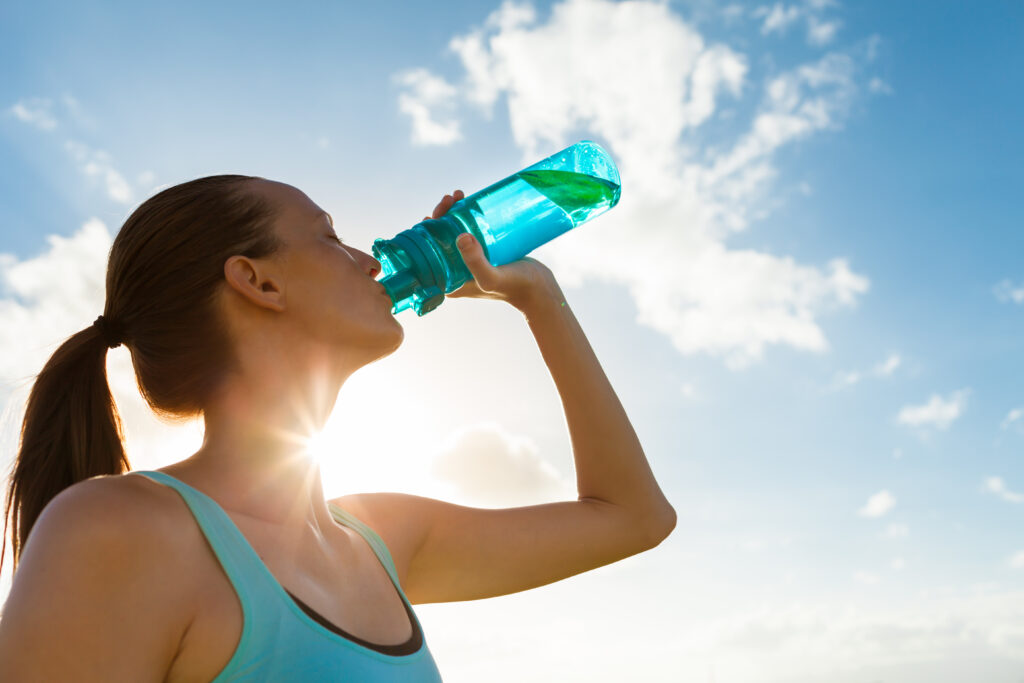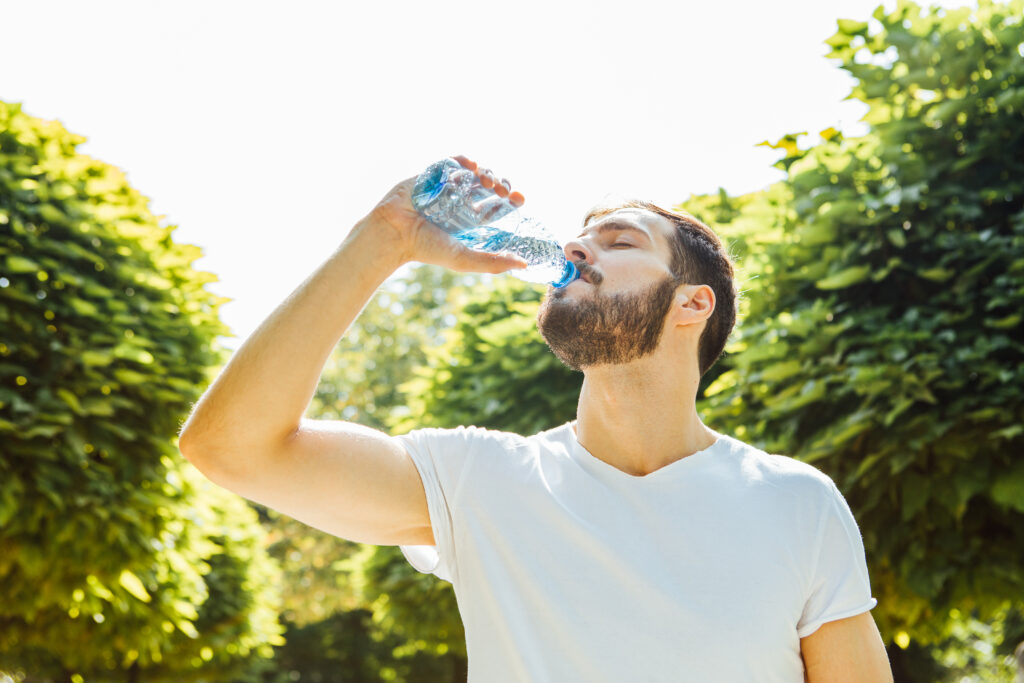June 23, 2023
How Many Bottles of Water Should I Drink In a Day?
Hydration plays an important role in your overall health, given how the human body depends greatly on water for survival. Without enough water, you can face problems such as seizures and kidney damage. But exactly how many bottles of water should you drink a day to stay healthy and hydrated?
Here’s what health experts say about the amount of water you should be drinking every day, and how to request an appointment with Healthcare Associates of Texas for primary care services.
What Are the Health Benefits Of Water?
Water offers countless health benefits. It helps lubricate your joints to reduce the risk of joint pain. It can help you experience regular bowel movements.
Here are several other health benefits of water:
- It helps regulate your body temperature (especially in the heat).
- It helps your body form saliva and mucus.

- It helps the blood carry oxygen throughout your body.
- It contributes to healthy and young-looking skin.
- It contributes to good brain health.
- It helps regulate your blood pressure.
- It helps your body flush out waste in the form of sweat, urine, and bowel movements.
- It can prevent overeating and help with weight loss.
- It can reduce your risk of feeling ill after drinking too much alcohol.
- It can enhance your athletic performance.
Why Is It Important To Stay Hydrated?
Staying hydrated helps your body function better as a whole. Water allows all your organs and senses to function properly as they should.
Without enough water, you can risk dehydration and several other complications. Some of the side effects associated with not drinking enough water include:
- Mood swings and irritability
- Persistent headaches
- Constipation
- Dry, dull-looking skin
- Fatigue and low energy
- Dry mouth and oral health problems
- Weight gain
- Kidney damage
- Stroke
- Poor brain health and brain functioning
How Many Water Bottles Should I Drink In a Day?
There is no single answer or formula regarding the exact amount of water you should drink daily. Every person needs a different amount of water based on their health status and lifestyle.
For instance, someone who spends lots of time outdoors exercising in hot temperatures may need far more water than someone who stays inside and works in an office every day. A woman who is nursing an infant typically needs more water than usual to maintain her milk supply. A person who is vomiting due to an illness will also need more water to avoid dehydration.
 Many doctors recommend drinking at least eight glasses of eight ounces of water per day. However, you may need more or less water depending on various factors, such as those mentioned above.
Many doctors recommend drinking at least eight glasses of eight ounces of water per day. However, you may need more or less water depending on various factors, such as those mentioned above.
The U.S. National Academies of Sciences, Engineering, and Medicine suggests drinking the following amounts of water per day:
- About 15.5 cups (3.7 liters) of fluids a day if you’re male
- About 11.5 cups (2.7 liters) of fluids a day if you’re female
These amounts also include water from the foods you eat, such as fruits and vegetables. Watermelon, celery, and pineapple are some of the many fruits and veggies that naturally contain high amounts of water.
How To Know If You’re Properly Hydrated
Generally, there are two easy ways to know if you’re properly hydrated. You are most likely getting enough water if you rarely feel thirsty, and if your urine is light yellow or clear.
It also helps to be familiar with the signs of dehydration. If you can spot early signs of dehydration, you can drink more water to stay safe and avoid any related complications.
Common signs of dehydration include:
- Bad breath
- Dry mouth
- Cravings for sugar and junk foods
- Decreased urination
- Tiredness and fatigue
- Lightheadedness or dizziness
- Confusion
- Feeling thirsty
- Dark-colored urine that has a strong odor
Is It Possible To Drink Too Much Water?
Drinking too much water rarely becomes a serious health problem. The medical term for overhydration is hyponatremia.
Hyponatremia occurs when you drink more water than your kidneys can process. The electrolytes in your body—specifically sodium—can become diluted to the point that fluids move into your cells to cause inflammation and other serious symptoms. Nausea, vomiting, and muscle weakness are some of the symptoms of hyponatremia.
Certain factors may increase your risk for hyponatremia, or water poisoning. These risk factors include:
- Having a low body weight
- Being female
- Eating a diet low in sodium
- Taking diuretics
- Using antidepressants or pain medications
To avoid water poisoning, drink water whenever you’re feeling thirsty, and try not to overdo it. If you’re feeling nauseated, extremely tired, or weak after drinking too much water, contact your doctor right away.
Tips for Increasing Your Water Intake
If you’re struggling with drinking enough water, there are several things you can do to make sure you get more. Sometimes it only takes a few simple lifestyle changes to boost your hydration.
Steps you can take to increase your water intake include:
- Drink a glass of water when you’re having cravings for sugar or junk foods.
- Drink a glass of water first thing in the morning after waking. This may help prevent morning headaches and promotes regular bowel movements.

- Store water in your refrigerator to keep it cool. Fluids are more easily absorbed by the body when they are between 40 and 60 degrees.
- Check the color of your urine to make sure you’re not dehydrated.
- Take a water bottle with you everywhere you go.
- Make a point to drink more water if you are using medications that cause dehydration. Laxatives and drugs for diabetes, migraines, and high blood pressure may increase your risk for dehydration.
- Drink plenty of water before, during, and after exercising.
- Drink before you start to feel thirsty.
- Eat more foods with high water content, especially fruits and vegetables.
- Replace sugary drinks, coffee, and alcohol with water, given how these beverages are linked to dehydration.
- Drinkwater at mealtimes.
- Add citrus fruits like lemon and lime to water to enhance its flavor.
If you are concerned about not drinking enough water, have a conversation with your doctor. Your doctor can look at your medical history and talk to you about your diet and lifestyle to determine how much water you should be drinking to stay healthy.
Request an appointment with Healthcare Associates of Texas to access high-quality medical care for you and your family. Our services include primary care, imaging, sleep medicine, and much more!
References
- Review of Report Sets Dietary Intake Levels for Water, Salt, and Potassium to Maintain Health and Reduce Chronic Disease Risk. 2004. National Academies of Sciences, Engineering, and Medicine. February 11, 2004. https://www.nationalacademies.org/news/2004/02/report-sets-dietary-intake-levels-for-water-salt-and-potassium-to-maintain-health-and-reduce-chronic-disease-risk.
- The Importance of Hydration. n.d. Texas Health and Human Services. https://www.hhs.texas.gov/sites/default/files/documents/services/health/texercise/importance-of-hydration.pdf.
- National Kidney Foundation. 2015. “Hyponatremia.” National Kidney Foundation. December 24, 2015. https://www.kidney.org/atoz/content/hyponatremia.
- Belval, Luke. 2015. “Hyponatremia | Korey Stringer Institute.” March 4, 2015. https://ksi.uconn.edu/emergency-conditions/hyponatremia/.
DISCLAIMER
The information featured in this site is general in nature. The site provides health information designed to complement your personal health management. It does not provide medical advice or health services and is not meant to replace professional advice or imply coverage of specific clinical services or products. The inclusion of links to other web sites does not imply any endorsement of the material on such websites.